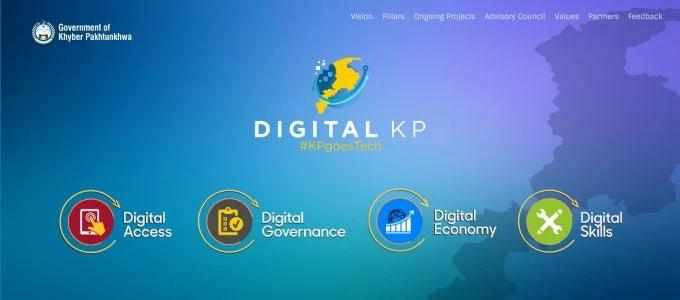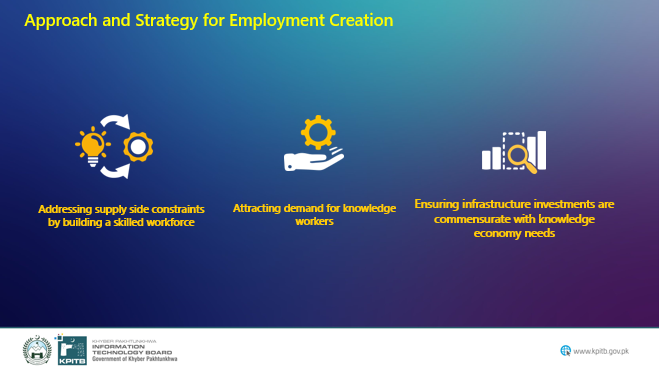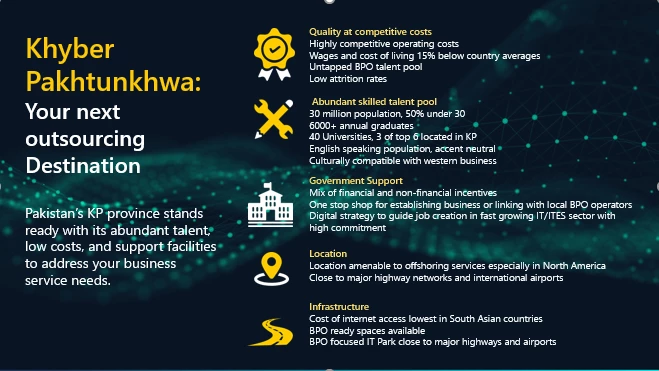
Pakistan’s Khyber Pakhtunkhwa province, or KP, has not always been recognized as a digital economy. Sharing a border with Afghanistan, the province experienced a period of instability and militancy over several decades that saw outmigration and the decline of private industries. Since then, the province has shown rapid economic growth, advancements in security, improvements in basic health and education, and a renewed sense of optimism.
Today, around half of the province’s population of 30.5 million is under the age of 30, necessitating rapid growth and job creation. In 2014, the Government of Khyber Pakhtunkhwa partnered with the World Bank to develop a strategy for job creation centered on leveraging the digital economy to address youth unemployment.

Fast forward to 2018, and the province of Khyber Pakhtunkhwa has launched a comprehensive digital strategy, called “Digital KP”, that outlines a program on digital development, with a core objective to promote youth inclusion in the digital economy. Within this broader digital strategy is a strong focus on promoting job creation for youth.
Addressing youth employment through the digital economy has three key building blocks:
- Addressing supply side constraint by building a skilled workforce: In thinking about job creation programs, the first building block is the availability of a skilled workforce. In KP, several programs focus on building the skill base of youth in the province. The flagship Youth Employment Program is Pakistan’s first digital skills platform, connecting youth with training, skills and employment opportunities, using a flexible and adaptive approach to accommodate the rapidly changing demands of the digital economy. An Early Age Programming course, launched in partnership with the Elementary and Secondary Education Department, focuses on teaching coding skills to secondary school students in a fun an interactive way, to prepare the next generation of knowledge workers. Finally, the Digital Ambassadors Program brings digital literacy programming to underserved areas to ensure that that poor and marginalized communities have the skills to participate in digital life. These three programs are the start to developing the skills for the future of work.
- Attracting demand for knowledge workers: The next challenge is to attract and support investment and growth of digitally enabled businesses for job creation. Three pathways to digital employment were identified. The first pathway identified was through the growing area of online work, which enables peer to peer transactions in global marketplaces between employers and job seekers for different kinds of short term work. Programs such as the Youth Employment Program directly facilitate learning around freelancing and gig work. The second pathway identified was around linking youth with the emerging domestic demand for digital skills. Pakistan, as a whole, is undergoing a digital transformation, with rapidly expanding mobile and broadband connections, and a growing number of domestic businesses digitizing their services. Many youth will find local jobs (both short term freelancing and full time) as the demand for digital skills grow. The KP Government is looking to actively promote the growth of local IT and digital businesses through tax relief, promoting incubation and entrepreneurship in its network of co-working spaces (durshals), and through promoting these in annual tech events, such as the Digital Youth Summit. Finally, the KP Government’s Information Technology Board has initiated a program to attract investment in IT and digital businesses in Khyber Pakhtunkhwa. A recent assessment conducted by the World Bank found that #Pakistan’s Khyber Pakhtunkhwa has highly competitive operating costs and wages when compared to other cities in Pakistan and abroad. It also has a large, untapped talent pool, good universities, and large English-speaking population and is setting itself up nicely to attract outsourcing and product development work. The Government recently announced a package of support for businesses who invest in KP, including a mix of financial and non-financial incentives, and strong government commitment to the growth of this sector.
- Ensuring infrastructure investments are commensurate with knowledge economy needs. The final building block for promoting digital jobs is to ensure the enabling infrastructure supports the knowledge economy. The government is investing in fiber optic networks with private partners, as well as a network of co-working spaces to address gaps in access. Investments in BPO ready spaces in Peshawar and Abbottabad will attract international and national companies interested in taking advantage of KP’s advantageous costs and talent pool. Finally, the Government has made steps to establish Pakistan Digital City, a 500-acre business ready park, in close proximity to Islamabad.
Want to learn more? Register for the upcoming Digital Youth Summit in Peshawar April 27-28, access the Digital KP strategy, and keep up with updates through Facebook and Twitter.



Join the Conversation